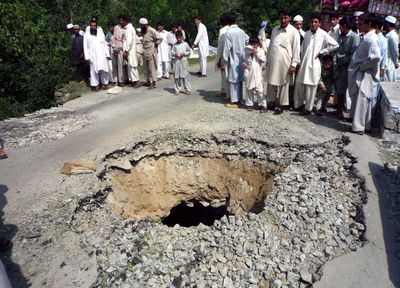Suicide bombers kill 60 at Pakistani weapons plant
Taliban militants claim responsibility

ISLAMABAD, Pakistan – A twin suicide bombing Thursday killed at least 60 people at a military ordnance factory north of Islamabad, part of a surge in Islamic extremist violence that comes as the government teeters on the brink of collapse.
In probably the worst terrorist attack on a Pakistani military installation, two bombers blew themselves up at different gates of the giant plant in Wah, about 20 miles from the capital, just as hundreds of workers were coming through for the afternoon change of shifts.
Unofficial reports put the death toll at 64, with 100 wounded. Earlier this week, a bombing at a hospital in Dera Ismail Khan, in the northwest, killed 27 people. Pakistan’s Taliban movement, which is linked to al-Qaida, claimed responsibility for both bombings.
The Taliban can strike at will, analysts said Thursday. The Wah arms plant, which is the biggest munitions-manufacturing facility in Pakistan and is heavily guarded by the army, is one of the most well-protected places in the country.
“This is an intensification” in the attacks, said Talat Masood, a retired general who once headed the factory. “They’re trying to blackmail the government.”
Pakistani security forces are fighting militants in Bajaur, part of the country’s tribal border area with Afghanistan, and in Swat, a valley in the northwest. Separately, an intertribal conflict has erupted in Kurram, another part of the tribal territory, in which some 350 locals have died in the last two weeks. Pakistan’s tribal territory is used as a launch pad for insurgents in Afghanistan, according to U.S. and NATO commanders.
The militants appear to be exploiting the political vacuum in Pakistan. Elections in February brought a coalition government to power that has never been able to jell. It was able to come together briefly in a move that ousted Pervez Musharraf as president on Monday, but the political parties quickly deadlocked again. While the parties are at odds over the judiciary, there also is no consensus on how to tackle the extremist challenge.